Celebrating Eid without loved ones
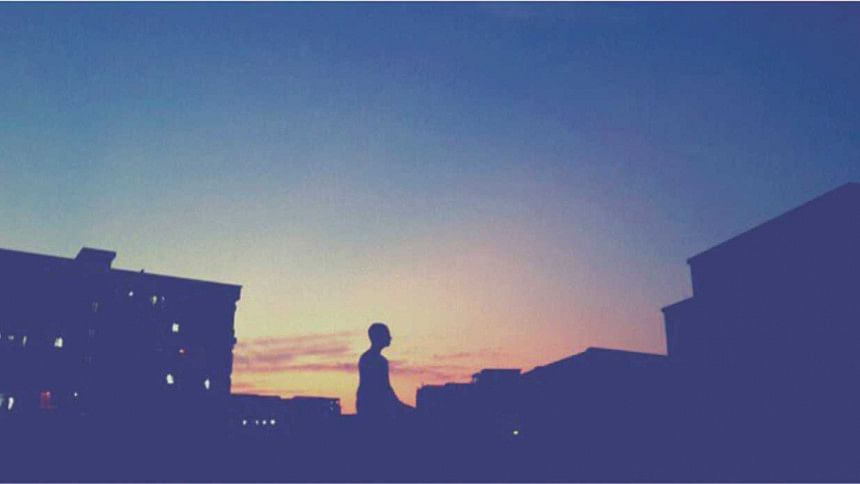
Although it's been five years since my mother passed away, the joy of Eid is rarely felt within the confines of our home since we had lost her in the month of Ramadan. We used to have relatives visit us on the mornings of Eid, but that doesn't happen much now. Dad's usually out visiting his colleagues in the morning while my sister and I sleep in late. Friends come over, or we go visit our relatives and grandparents. We make it a point to visit her grave on Eid day.
Eid just does not have that excitement anymore. It used to be a celebration on its own, but now it's just something I go through for the sake of it. I used to go shopping with her for Eid, except now it's with my aunts.
I miss her. I miss being excited about Eid.
— Adiba Mahbub
My Nani and Dadi are sisters who are only a year apart. Nani is younger and they've spent the last 26 Eids trying to outshine each other with the gifts they gave us. If the dress that Dadi got me had sparkles, Nani would go through some silent heartache. If Nani surpassed her sister with the density of embroidery, there would be plenty of not-so-silent heartache. As a result, our Eid clothes could not be black or white (that's for funerals), had to have embroidery or sparkles, and would only be fit for an occasional party.
There's no gift from Nani this time around; I doubt she even realises that Eid is coming up. Her biggest challenge these days is trying to accept that light equals day and she needs to eat to survive. Conversations are met with a glassy stare, her mouth hanging open. We lost her sometime last November, the exact date is unknown. It was around the same time we went to the village home leaving her in Dhaka with a promise of a future trip when she gets better. She never did—neurodegenerative diseases don't work like that.
On the other hand, my Nana who has never bought me clothes just got me an Eid dress!
— Zyma Islam
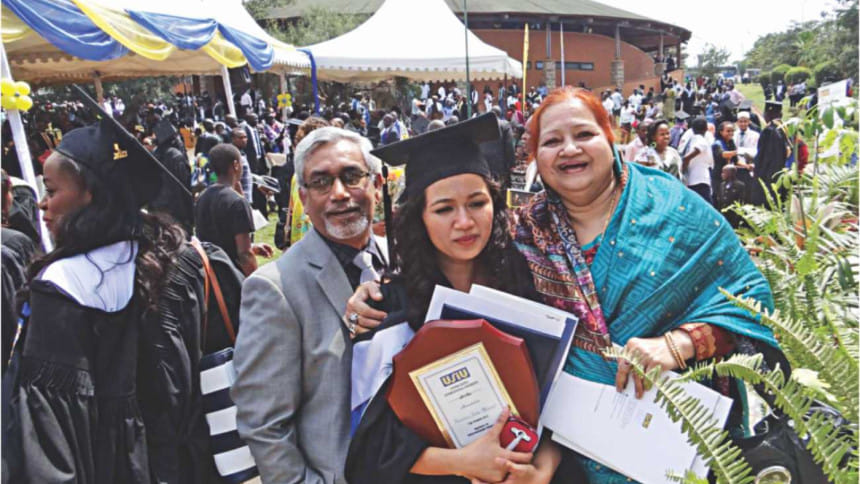
Dear Abbu,
Just like the past 27 letters I have written to you over the last two years, perhaps this will go unanswered as well. But you know me. I am stubborn.
Do you remember the day before Eid every year when we would go to the bazaar together to buy vegetables, fruits, meats and spices? All the bazaar's shopkeepers would excitedly call out your name and shout out greetings to you. They all adored your bargaining style—scavenging for the best in the market no matter how long it took, bargaining to get things at half price for another 15 minutes, and tipping the shopkeeper twice the value of the product. I think you were too engrossed in enjoying the attention, colours, and hubbub of the bazaar to realise that your feeble daughter serving as your hopeless porter under the blazing afternoon sun was exhausted. But how could I ever resign from my position as your hopeless porter? My eyes still ache to see the spark in your eyes as you tell the shopkeepers exaggerated tales of the legendary and beautiful me, making me feel uneasy, albeit secretly, like the most treasured piece of creation. I promise I won't squabble with you this time. My ears are hankering to hear the echoes of your name piercing through the busy bazaar, making me hide my face under your shawl in utter embarrassment, but privately made me feel proud to be the daughter of a man so loved. I promise I won't complain about walking an extra two miles to get onions for two taka less per kg this time. But without you, the bazaar is just a grey and aging cemetery.
Do you remember Abbu, how you and I would accompany Ammu the whole night as she invented new dishes in her secret lab that neither one of us had access to? We sat together in front of the TV drinking tea and contemplating why she would not trust either of us to help. We were quick to forget our past blunders, but she was not. We would never dare ask her why she didn't give us another chance lest she reminded us how you once added sugar instead of salt to her two kilos of gulabjammun dough or how I turned her cake into coal; and how these unfortunate incidences threatened to shake her reputation as the best chef in town, a title so close to her heart. But at least we did justice to our titles as the first tasters of her famous mouth-watering biryani, korma, halim, roast, beef rezala, kheer, jammuns all night and passed our expert judgments in diplomatic tones and applauded ourselves in private as the secret to her exceptional cooking. But without you now, Ammu's cooking is just insipid and lifeless food.
Do you remember Abbu, on the morning of this special day, how you would relentlessly hanker and pester Dadubhaia and Borobhaia to wake up and take a shower lest they miss the first jumma prayers? They would both take forever to get ready, as Ammu and I would chuckle naughtily watching you walk tensely to and from their rooms, shouting sarcastic banter. No matter how anxious you got over missing the prayers, you always hugged them and took your time to let them know how much they meant to you before you all left the house in your new white cotton panjabi. I know why you hugged me last, so you could give me the biggest salami of all and a special gift. I still have that white teddy bear holding the big heart, Abbu. But without you now, my salamis are loveless, empty materials.
I know where you are now, there are no postmen to deliver letters, but I still write. It is my 28th letter and just like the time I wrote the 27th or the 26th letter, my hope is undying that I will compel you to relive these moments with us again. This time Bubu and I will celebrate our Eid with some little souls in a small madrasa nearby, in the hope that we will find you in the spark of their eyes and in the playfulness of their laughter.
Eid Mubarak, Abbu.
Your daughter,
Julie
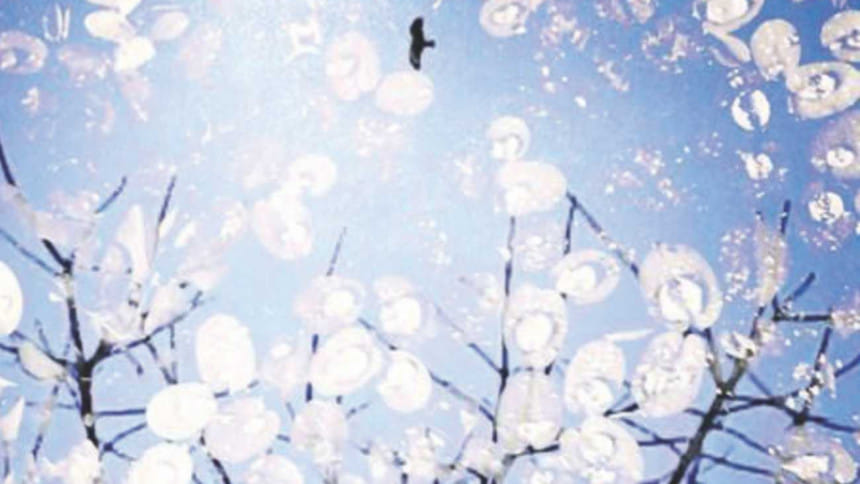
It has almost been two years without my father. I still can't get used to the fact that we will be passing yet another Eid without him.
During any festival, family members spend time together, enjoy the moment together. This is supposed to be the best part about Eid; but this realisation creates an indescribable hollowness inside us—when we digest the fact that we won't be "together".
My mum, my younger sister and I are usually very good at not expressing our emotions. But this is the time of the year when the absence of my father leaves all of us in tears. No one even bothers to pretend that everything is okay.
I miss him the most during Eid. I miss his presence more than our small interactions. I miss how excited my mum would be about Eid. I miss how my sister would show her newly bought dresses to her father. I miss how he would always suggest which Bangla dramas to watch and which to avoid. I miss the atmosphere which is just not there and never will be.
But the good thing about Eids nowadays is that the three of us connect and bond more than ever knowing that he is now in a far better place.
— Johan Ahmed
9.30 am Everything would go on just fine. Eid Salah would be done. You would knock on the door saying "Kuttibuuu…", the name you call your sister. You would be in all white, from tupi to panjabi-pajama. Saika and I would run to you for salami. I would bargain until I got the biggest amount and Asya would come and fight with me. In the end, you would satisfy everyone with the same amount, but secretly I would be the winner. By the time Abbu comes from Eid Salah, the food would have been served on the table. Abbu and you would be eating, while Ammu would be sitting and chatting with you. After a while, guests would start coming and you would be busy giving salami to the kids. While we would be busy exchanging greetings, you would be in charge of serving them, all the while telling your funny jokes, making them burst into laughter. By then, our house would come alive with the laughter and joy of Eid.
This is how the happy tradition of Eid continued in our family till now. But now you are far away from all the joy and laugh, from the responsibilities which you would always take on you. This year the silence will hang heavy over us, the memories afloat in our minds. The only thing we can do is make calls to your number, which Ammu kept active so that we could still feel your presence. A very new, unwanted Eid morning is waiting with the memories that you left in our hearts. Every single moment will be haunting us with emptiness in every little thing, as we search for you in them.
Mama, you will never know how we are always needing you for a thousand of thing. Still, in our hearts, we will find you whenever we need you, because you will always be there.
— Sara Khanam
Well, you are going to read a daughter's diary. Diary of how she is going to spend Eid day. You are not going to hear a standardised Eid day celebration with Mum's special 'shemai' or Dad's huge 'salami'. You are going to read about how an Eid day is spent without these two persons, or celebrating Eid day without your soul, that's the word you can use may be?
It was the night of Eid-ul-Azha when I lost my Dad. It was uninvited. A silent heart attack took him forever in the matter of an hour.
After that day, all other Eids became unceremonious. They came, but without waking up to his call, without the urge to wear new clothes, and without waiting eagerly for him to return to give salami. Without having delicious food with the whole family and watching Eid specials on television. I started to spend Eid without hearing from my Dad that I look like Aishwariya in my new dress. Yes, that was the word my Daddy dearest used to describe her daughter. You might be judgmental and take it as an exaggeration, but trust me, part of me, believed him. Just the way I believed he was going to come back shortly, which he never did.
Eids are no longer gloomy. They've become lifeless. They come and go. I can hardly differentiate any other day from Eid day. I ask myself, isn't it supposed to be special? After the remaining colour of my life, dearest Mamma, followed Dad to heaven, Eid has become a distant dream for me. A dream I will never be able to live again.
Like last year, Eid day is going to knock on our door as they are going to knock yours. I will wake up like you do. But no one will be waiting with 'payesh'. No one will nag me to wake up, get dressed. I will spend the day silently. But trust me, like every year, I will try my best to smile. Laugh with my sisters, because I believe the Almighty will tell my parents everything. You tell me, if we were upset on an Eid day, how would they feel? I can't hurt them! So I will try to put a smile on my face to bring a smile on their faces too. The only difference is, I cannot see that smile, but surely, I will feel it in my heart.
— Jannatul Mawa
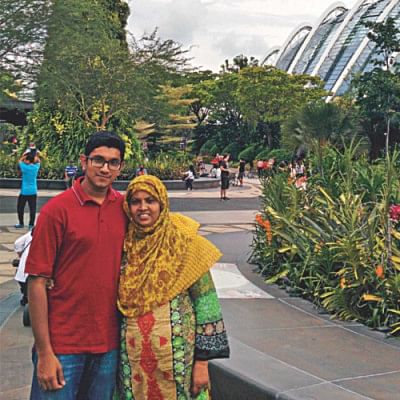
It never gets easier. We just get used to not having them around. As we keep getting desensitised, days like Mother's day or Eid Ul Fitr remind us how much we miss them.
This is the first Eid without my mom since she passed away last year and I have no idea how this one will turn out to be. Usually, all our relatives would come to our house for lunch on the second day of Eid and my mom would cook (of course she was the best cook in the world). She would cook all day, serve the food and when everyone ate just about as much as they could, she would force more chicken roasts on their plates. I guess there will not be any lunch at our home this Eid.
All of us will go to my uncle's house for dinner. Amidst all the joy and laughter, they will feel her absence just like me but no one will say it out loud. I suppose saying it makes it all too real. It's not that the Eid is going to be all gloomy, it's just that at the back of my mind that feeling will persist as I become used to that feeling bit by bit.
— Sabab Rahman
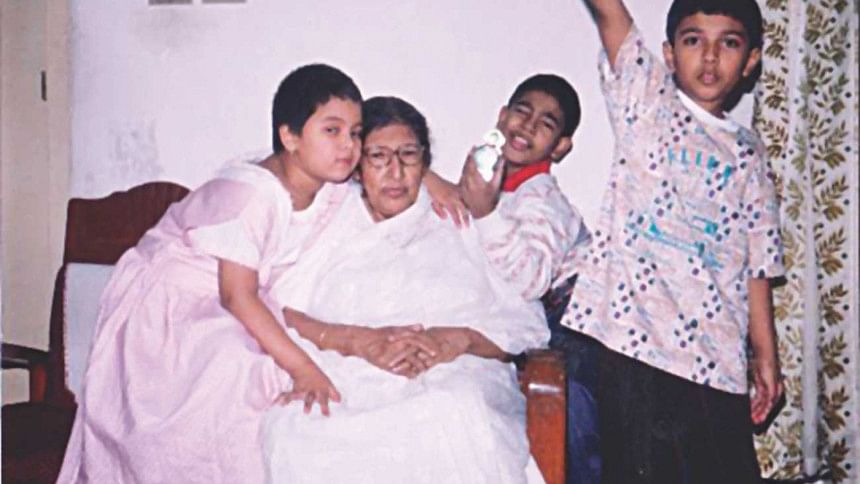
Seven sons, one daughter, many grandchildren, and countless other relatives: it usually turned into a family reunion every Eid at Flat 9D of Nakshi Tower in Shegun Bagicha. All the gathering was centered around one person, Ms. Khorsheda Khatun, i.e. my loving "Dadu". Over 90 years old and the only surviving member of her generation in the family, she used to be the rock that kept our huge family together.
Being the eldest grandson, I shared a very intimate relationship with her. So many lazy afternoons had passed sitting in front of her listening to countless stories. The same stories kept repeating in regular cycles but I never got bored because of her excitement in telling them. I have heard stories of her early life in Kolkata when she had just married my grandfather, a civil servant working in the food department. I heard stories of their plight during our war of liberation. She used to get so emotional when she talked about the Pakistani Army taking her eldest son, a military officer then, into their custody and the continuous torture on him afterwards. She would talk about their hardship when my grandfather retired soon after Bangladesh's liberation and how she struggled to keep the family together. Listening to her was like listening to a living history of Bangladesh, from the perspective of a middle class housewife and her journey through the political and economic reality of the time.
She left us on a rainy night in August 2013. Getting up from the grave after laying her down is the hardest thing I have ever done. I still regret not being by her side during her last moments. Oh how I wish to know what her last story would have been for me! And how I miss her every Ramadan, every Eid, and every celebration. That house feels so empty without her that I have stopped going there altogether even though two of my uncles and their family still live there.
After she left us, family members divided all her belongings among them. I was called and asked what I wanted to take and I chose only one thing: her prayer mat that she used even on the night she left the world. From then till now, I use that prayer mat every time I pray and every single time I can smell her in it. Dadu, I hope you are happy and content in heaven, but we miss you down here so terribly. Eids are never gonna be the same again without you.
— Syed Ibrahim Saajid

 For all latest news, follow The Daily Star's Google News channel.
For all latest news, follow The Daily Star's Google News channel. 

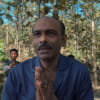


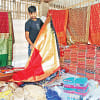
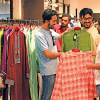


Comments